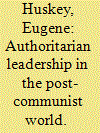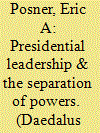|
|
|
Sort Order |
|
|
|
Items / Page
|
|
|
|
|
|
|
| Srl | Item |
| 1 |
ID:
146253


|
|
|
|
|
| Summary/Abstract |
The Führerprinzip has not been confined to Nazi Germany. The cult of the strong leader thrives in many authoritarian regimes and has its echoes even in contemporary democracies. The belief that the more power a president or prime minister wields the more we should be impressed by that politician is a dangerous fallacy. In authoritarian regimes, a more collective leadership is a lesser evil than personal dictatorship. In countries moving from authoritarian rule to democracy, collegial, inclusive, and collective leadership is more conducive to successful transition than great concentration of power in the hands of one individual at the top of the hierarchy. Democracies also benefit from a government led by a team in which there is no obsequiousness or hesitation in contradicting the top leader. Wise decisions are less likely to be forthcoming when one person can predetermine the outcome of a meeting or foreclose the discussion by pulling rank.
|
|
|
|
|
|
|
|
|
|
|
|
|
|
|
|
| 2 |
ID:
146250


|
|
|
|
|
| Summary/Abstract |
A quarter-century after the collapse of the USSR, authoritarian politics dominates seven of the fifteen successor states. Placing the post-communist authoritarian experience in the broader frame of nondemocratic governance, this essay explores the origins and operation of personalist rule in the region; the relationship between time and power; and the role of Soviet legacies in shaping the agenda and tools of leadership. It also examines the efforts of post-communist authoritarians to enhance personal and regime legitimacy by claiming to rule beyond politics. Within the post-communist world, the essay finds significant variation among authoritarian leaders in their approaches to personnel policy and to the use of policies, symbols, and narratives to address the ethnic and religious awakening spawned by the collapse of Soviet rule. The essay concludes with a brief assessment of the trajectories of post-communist authoritarian leadership.
|
|
|
|
|
|
|
|
|
|
|
|
|
|
|
|
| 3 |
ID:
146254


|
|
|
|
|
| Summary/Abstract |
Although it is widely assumed that successful polities require strong leaders, something like the opposite is probably the case. A successful political system may well be one that has no need of strong leaders and may even eschew them. Strong leaders may occasionally be desirable in any polity, but those occasions are–or should be–rare. As often as not (possibly more often than not) strong leaders pose substantial risks. They are liable to do as much damage as good, possibly more. There is a lot to be said for any polity's political culture and institutions having built into them a fair amount of “leader proofing.”
|
|
|
|
|
|
|
|
|
|
|
|
|
|
|
|
| 4 |
ID:
146245


|
|
|
|
|
| Summary/Abstract |
The goal of this essay is to clarify the relationship between leadership and equality as two essential constitutive factors of a democratic political system. The essay is motivated by concern about increasing inequalities in the political system of the United States and other countries that describe themselves as democracies. The first section notes the logical tension between leadership and equality, and spells out my understanding of the key terms I use in this essay. I show how the tension between leadership and equality poses a conundrum for democratic governance. Yet the crux of my argument is that profound socioeconomic inequalities pose the more basic threat. I identify disparities in power, as distinct from leadership, as the root of the problem here.
|
|
|
|
|
|
|
|
|
|
|
|
|
|
|
|
| 5 |
ID:
146251


|
|
|
|
|
| Summary/Abstract |
This article argues that the leadership industry has been beset by a bias. This bias has been directed toward leaders and away from two other variables that equally pertain–and that equally explain the trajectory of human history. The first is followers, or others who are in any way relevant, even if passively. And the second is contexts, within which leaders and followers necessarily are embedded.
Together these three parts, each of which is equally important and each of which impinges equally on the other two, make up the leadership system. This article suggests that the approximately forty-year-old leadership industry has paid a heavy price for its obsession with leaders at the expense of whoever/whatever else matters. For the industry has not in any major, measurable way improved the human condition, which is precisely why it should be reconsidered and reconceived.
|
|
|
|
|
|
|
|
|
|
|
|
|
|
|
|
| 6 |
ID:
146252


|
|
|
|
|
| Summary/Abstract |
Many classic studies of leadership focus on strong leadership in the singular. This essay focuses on effective leaderships in the plural. Some of the greatest failures of democratic transitions (Egypt, Syria, Libya) have multiple but highly conflictual leaderships. However, a key lesson in democratization theory is that successful democratic transitions often involve the formation of a powerful coalition, within the opposition, of one-time enemies. This was accomplished in Chile, Spain, and Indonesia. In greater detail, this essay examines Tunisia, the sole reasonably successful democratic transition of the Arab Spring. In all four cases, religious tensions had once figured prominently, yet were safely transcended by the actions of multiple leaders via mutual ideological and religious accommodations, negotiated socioeconomic pacts, and unprecedented political cooperation. A multiplicity of cooperating leaders, rather than a single “strong leader,” produced effective democratic leadership in Tunisia, Indonesia, Spain, and Chile.
|
|
|
|
|
|
|
|
|
|
|
|
|
|
|
|
| 7 |
ID:
146247


|
|
|
|
|
| Summary/Abstract |
The presidents who routinely are judged the greatest leaders are also the most heavily criticized by legal scholars. The reason is that the greatest presidents succeeded by overcoming the barriers erected by Madison's system of separation of powers, but the legal mind sees such actions as breaches of constitutional norms that presidents are supposed to uphold. With the erosion of Madisonian checks and balances, what stops presidents from abusing their powers? The answer lies in the complex nature of presidential leadership. The president is simultaneously leader of the country, a party, and the executive branch. The conflicts between these leadership roles put heavy constraints on his power.
|
|
|
|
|
|
|
|
|
|
|
|
|
|
|
|
| 8 |
ID:
146246


|
|
|
|
|
| Summary/Abstract |
Leadership is an influence process that centers on group members being motivated to reach collective goals. As such, it is ultimately proven by followership. Yet this is something that classical and contemporary approaches struggle to explain as a result of their focus on the qualities and characteristics of leaders as individuals in the abstract. To address this problem, we outline a social identity approach that explains leadership as a process grounded in an internalized sense of shared group membership that leaders create, represent, advance, and embed. This binds leaders and followers to each other and is a basis for mutual influence and focused effort. By producing qualitative transformation in the psychology of leaders and followers it also produces collective power that allows them to coproduce transformation in the world. The form that this takes then depends on the model and content of the identity around which the group is united.
|
|
|
|
|
|
|
|
|
|
|
|
|
|
|
|
| 9 |
ID:
146249


|
|
|
|
|
| Summary/Abstract |
This essay explores aspects of the relationship between political leadership and institutional power, comparing the different forms that presidential institutions have taken across the world and identifying the relationship between these structures and social, political, and economic outcomes. Semipresidential systems are distinguished from presidential systems, and within the former, a distinction is made between president-parliamentary and premier-presidential regimes. Some scholars have argued that presidential regimes are less conducive to the successful transition from authoritarian rule to democracy than are parliamentary governments, but the empirical evidence is contradictory. Recent research has, however, drawn attention to finer distinctions within the various broad categories of presidentialism, focusing on more precise institutional arrangements and trying to identify which are more, and which are less, consonant with the consolidation of democracy.
|
|
|
|
|
|
|
|
|
|
|
|
|
|
|
|
| 10 |
ID:
146248


|
|
|
|
|
| Summary/Abstract |
Women are drastically underrepresented in American political institutions. This has prompted speculation about the impact of electing more women on policy and the functioning of government. Examining the growing presence of women in Congress, I demonstrate that women do exhibit unique policy priorities, focusing more on the needs of various groups of women. However, the incentive structure of the American electoral system, which rewards ideological purity, means that women are not likely to bring more consensus to Washington. Indeed, women's issues are now entrenched in the partisan divide. Since the 1990s, the majority of women elected to Congress have been Democrats, who have pursued their vision of women's interests while portraying Republican policies as harmful to women. In response, Republican women have been deployed to defend their party, further reducing the potential for bipartisan cooperation.
|
|
|
|
|
|
|
|
|
|
|
|
|
|
|
|
|
|
|
|
|